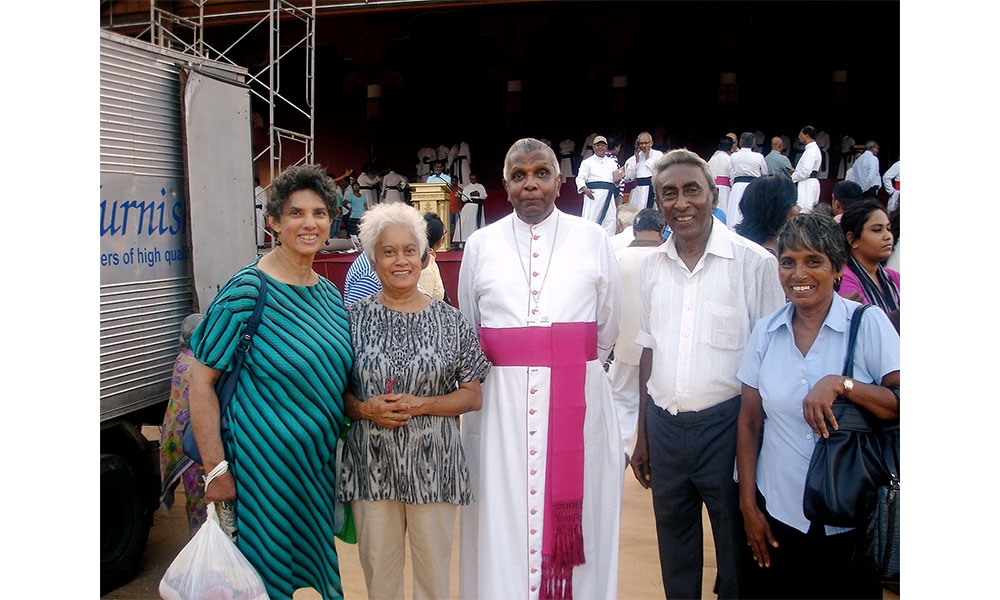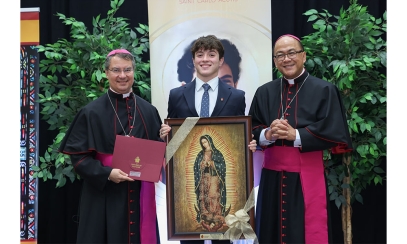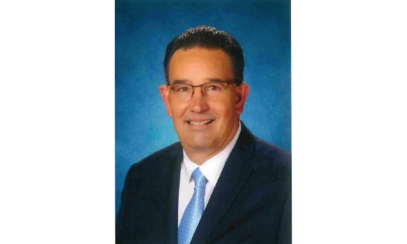
Working for the Canonization of Saint Joseph Naik Vaz: Filomena Giese
Filomena Giese first learned about Saint Joseph Naik Vaz, Sri Lanka’s only saint, “from my parents, who heard his heroic story from their parents and the Catholic community in Goa, India, where he was born and where we were from.” This connection led to her founding the Joseph Naik Vaz Institute in Berkeley, California, which significantly contributed to the final stage of the saint's canonization.
Pope Francis only recently canonized Saint Joseph Vaz in 2015 during his papal visit to Sri Lanka. It was a deeply personal moment for Filomena: “Personally, through St. Joseph, I have a stronger connection to a belief in Christ, to the inner spiritual power of identifying with Him and showing our love for our neighbor through service and love.”
Saint Joseph Vaz’s sainthood also marks a significant moment for the Church in Asia. As Filomena explained, “His story is unique in the vast expanse of cultures in Asia he touched and for whom he continues to be a relevant figure.” Her website states, “Saint Joseph Naik Vaz is an Indian missionary born in Goa, who successfully re-built the Church under persecution in Kanara (Mangalore), India, and Sri Lanka.” Through the saint’s example, she shared, “I do feel closer to understanding better what it means when we say we are one Body in Christ.” Father Joseph Vaz’s life serves as the source for Filomena’s deepening sense of ecclesial unity.
Convinced
Filomena is convinced that Catholics in the Bay Area do or will want to know about Saint Joseph once they learn of his role in the Church. She cited how he, “smuggled himself to other South Asian countries against the Dutch colonial anti-Catholic laws.” According to her website, Saint Joseph Naik Vaz’s clandestine, ecclesial outreach resulted in the creation of an enculturated para-liturgy and literature in the two principal languages of Sri Lanka: Sinhala and Tamil.
Due to these and to Saint Joseph Vaz’s nurturing of the underground Catholic Church in Sri Lanka, Giese is now lobbying to add the title of patron saint to his saintly title. Most notably, she advocates for his becoming a patron of medical first responders. She shared why, “He cared for smallpox victims during the Buddhist kingdom of Kandy around 1696.” However, other titles, she insists, can easily be added to his proposed patronage, including that of patron of religious freedom, of the laity, of education and of the priesthood of tribal peoples, inter-religious relations, Native Catholic para-liturgy, and Catholic literature.
In this generation, where notions of synodality are emerging as an integral aspect of today’s missionary Church, Giese also believes that Saint. Joseph Vaz is a synodal saint. According to Filomena, “His methods are very much in keeping with the values of the Universal Synod. He consulted with his laity and established small Christian communities. He trained the laity to run his underground chapels, schools, and health clinics, as he had only a few priests to help him. He respected local identity and names, languages, and cultures.” Ahead of his time, it seems, Saint Joseph could be considered a model for building bridges between faiths and cultures even now.
The Institute
Through the institute, she and her supporters are bringing the heroic life and work of St. Joseph Naik Vaz to the forefront of the Church’s attention. “We Indian-Sri Lankan Catholics have a great eucharistic story to share with the American Church,” she told The Valley Catholic, citing instances from the Saint’s life where, “he brought the Mass and the eucharist to abandoned and persecuted Catholics.” At a time of the national Eucharistic Revival, she sees this as relevant to the Church but also to Sri Lankan and Indian Bay Area Catholics. “Bay Area Indian-Sri Lankan Catholics are hardly told anything about the Catholic history and the spiritual legacy they have inherited from this very great South Asian saint.”
The Joseph Naik Vaz Institute celebrated its 46th year under Filomena’s leadership. She has spent a lifetime advocating for the canonization of Fr. Joseph Vaz and working for change in her native Goa. In 2000, she founded the organization Goa Sudharop to work for sustainable development in Goa and help the disadvantaged. Her organization now serves women in her native land, "We are working in Goa, helping women get farming work, training in sewing, and literacy.” She is pursuing this while working for her saint’s cause.
Lifelong Devotion
Filomena credits her father with her early devotion, “Whenever my father went to Goa from Singapore, he attended Mass at the Sancoale Sanctuary, and then would pray at Saint Joseph Vaz’s shrine.” He regaled his family with stories from the shrine. From this, Filomena learned and remains convinced that “St. Joseph Vaz was extraordinary in how he touched the lives of many of our South Asian communities. He was and is an evangelizer and apostle of all of them.”
She shared the impact of working for the cause of St. Joseph upon her faith, “Before I knew about Fr. Joseph Naik Vaz, I would characterize my faith as one of faith and trust in the Gospels and the Word of God, in the Mass and the sacraments. But after reading about his life and work in both India (the Mangalore region of south-west India) and Ceylon (now known as the country of Sri Lanka) and learning about his witness, I have a stronger belief in Christ and his teachings about the inner power of showing our love for our neighbor through service and love.”
One particular story may sum up how Filomena is dedicated to serving her community and the Church by working to spread devotion to Father Joseph Naik Vaz, “We particularly liked the story of the jackfruit tree outside the window of Saint Joseph Vaz' room that had been there for over two centuries, since the time of the saint. It was always a symbol to me that all else passes, but the power of a saint lasts across time.”
Filomena Saraswati Giese is a native of Goa, India. She founded the Joseph Naik Vaz Institute in the Bay area to make his work under persecution known and to work for his beatification and canonization. Her parish is St. John the Baptist Church in El Cerrito.



